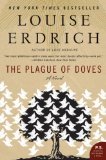Summary | Excerpt | Reviews | Beyond the Book | Read-Alikes | Genres & Themes | Author Bio

A Novel
by Louise ErdrichThis article relates to The Plague of Doves
Louis Riel
Many of the characters featured in The Plague of Doves
are
Metis. The Metis (historically known as the Bois
Brule) emerged in Canada in the mid-17th Century
as New World fur traders intermarried with Cree, Ojibwe,
Salteaux and Menominee natives. While mostly French, some of
the traders were English and Scots. Over time, the offspring
of these unions themselves interbred and had children of
their own, creating one of three Aboriginal peoples
recognized by the Canadian government.
The Metis homeland includes the Canadian provinces of
British Columbia, Alberta, Saskatchewan, Manitoba & Ontario,
as well as parts of the United States (Montana, North
Dakota, & NW Minnesota.). They speak Metis French or a mixed
language called Michif. Metis French is best preserved in
Canada, while Michif is more prevalent in the United States
(notably in the Turtle Mountain Indian Reservation of North
Dakota, where Michif is the official language).
Primarily fur traders and pioneers, the Metis acted as
translators between the First Nations and the Europeans in
Canada. They were well regarded as guides and trackers.
Louis Riel
One of the historical Metis mentioned in Plague of Doves
is the controversial Canadian folk-hero
Louis Riel. Riel was born in 1844 in the Red River
Settlement (now Manitoba) in Canada. After being educated in
both religion and law in Montreal, he returned to his
homeland in 1868. The provisional government he subsequently
established (1869-1870) ultimately negotiated the terms
under which the modern province of Manitoba entered the
Canadian Confederation, leading to Riel's recognition as
"The Father of Manitoba." Toward the end of this period,
referred to as the First Red River Rebellion, Riel ordered
the execution of Thomas Scott for "defying the authority of
the Provisional Government, of fighting with the guards and
insulting the President." As a result of this unpopular
decision, Riel was forced into exile to the United States.
While in the USA, Riel became convinced he was divinely
chosen as a leader and prophet of the Metis people, and
returned to Canada to represent Metis grievances
(particularly regarding land) to the Canadian government. He
led a resistance movement, which escalated into a military
confrontation in 1885 (the short-lived Second Red River
Rebellion). The rebellion ended with Riel's surrender. He
was tried under a charge of high treason, found guilty and
executed on November 16, 1885. The execution was widely
opposed and had long-lasting political ramifications.
On April 17, 2007, the Manitoba government enacted
legislation establishing
Louis Riel Day as the Third Monday in February. The
holiday was first celebrated on February 18, 2008.
Filed under People, Eras & Events
![]() This "beyond the book article" relates to The Plague of Doves. It originally ran in June 2008 and has been updated for the
May 2009 paperback edition.
Go to magazine.
This "beyond the book article" relates to The Plague of Doves. It originally ran in June 2008 and has been updated for the
May 2009 paperback edition.
Go to magazine.
Your guide toexceptional books
BookBrowse seeks out and recommends the best in contemporary fiction and nonfiction—books that not only engage and entertain but also deepen our understanding of ourselves and the world around us.